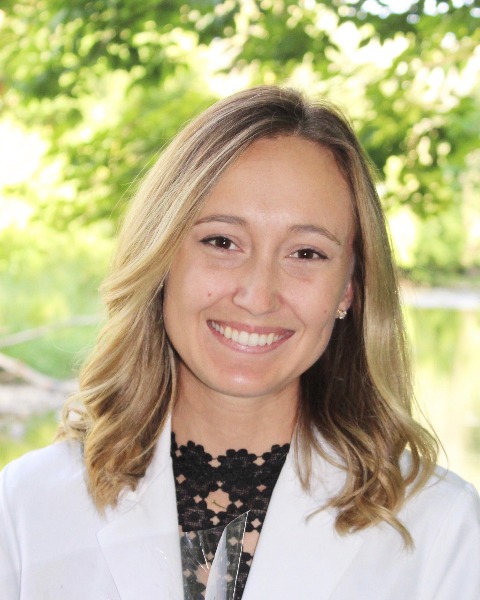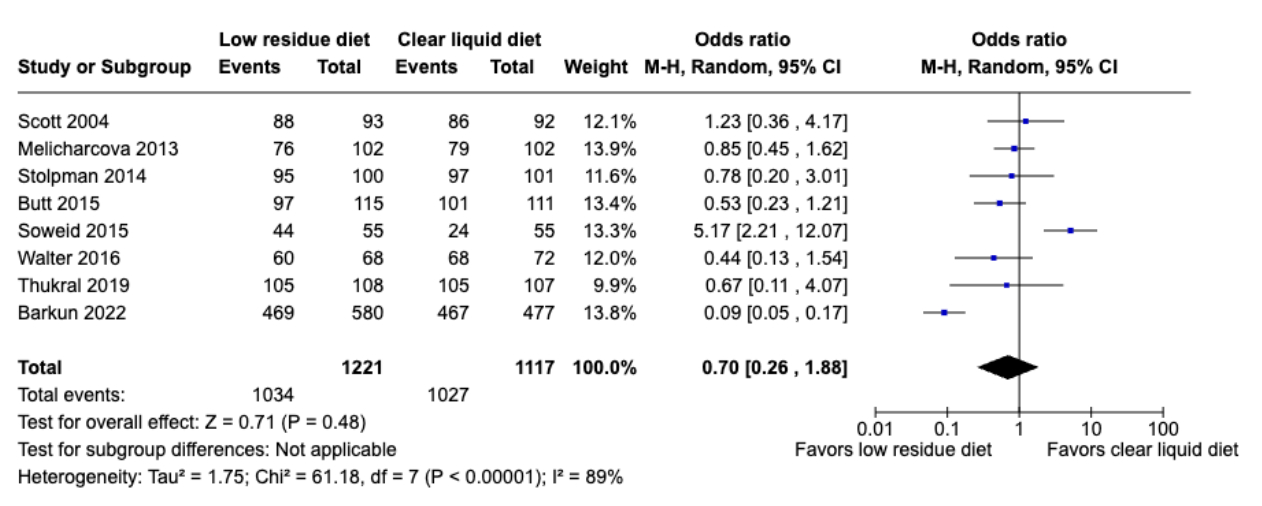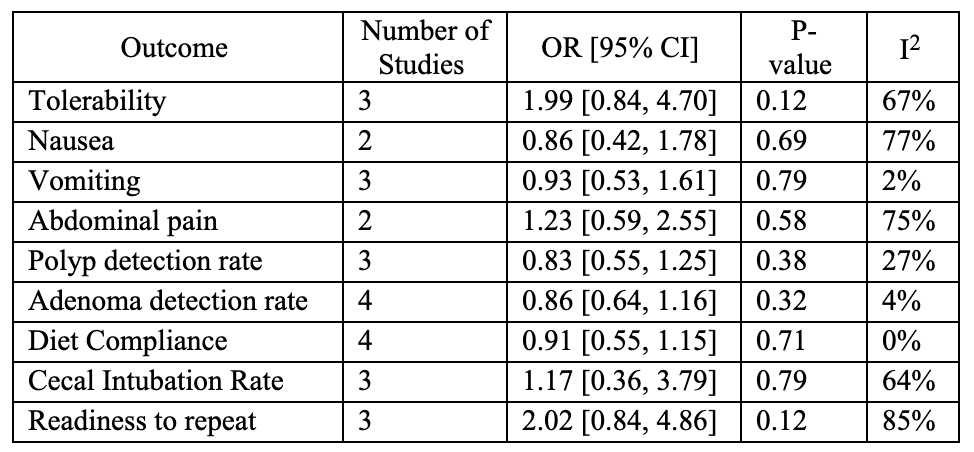Monday Poster Session
Category: Colon
P2411 - Low-Residue Diets Paired With Low Volume Preparations: A New Paradigm for Colonoscopy Bowel Prep – A Meta Analysis
Monday, October 27, 2025
10:30 AM - 4:00 PM PDT
Location: Exhibit Hall

Marie Balfour, MD (she/her/hers)
University of California Irvine Health
Orange, CA
Presenting Author(s)
Marie Balfour, MD1, Frances Dang, MD, MSc2, Joshua Kwon, MD1, Suhail Sidhu, MD3, Bryant Le, MD3, Momin Masroor, MD3, David Cheung, MD3, Yuri Kwon, MD1, Brian Mendoza, MD3, John G. Lee, MD4, Jason Samarasena, MD, MBA, FACG3
1University of California Irvine Health, Orange, CA; 2University of California Irvine, Irvine, CA; 3University of California Irvine, Orange, CA; 4UC Irvine Digestive Health Institute, Orange, CA
Introduction: Adequate bowel preparation is important in achieving a high-quality colonoscopy. A clear liquid diet (CLD) is generally recommended prior to colonoscopy; however, it may be associated with patient discomfort, hunger, and poor tolerability, impacting adherence to preparation. Moreover, these challenges are often exacerbated by the use of traditional large-volume bowel preparations. Recent bowel preparations have moved towards smaller volumes to reduce patient discomfort. Low residue diet (LRD), when paired with low-volume bowel preparation, could possibly be a more comfortable alternative without compromising the quality of bowel cleansing. The aim of this systematic review and meta-analysis was to compare the efficacy and tolerability of LRD and CLD in adults undergoing low-volume (≤ 3 liters) bowel preparation.
Methods: A literature review was conducted across multiple databases, including Cochrane Library, Scopus, Web of Science, PubMed, and ClinicalTrials.gov through October 2024. Only randomized controlled trials that compared LRD to CLD with low volume colonoscopy preparation were included. The primary outcome assessed was adequate bowel preparation. Secondary outcomes included tolerability, adverse events, polyp detection rates, adenoma detection rates, compliance with diet, cecal intubation rate, and readiness to repeat preparation.
Results: A total of 8 studies with 2338 patients were included. 1117 patients underwent CLD preparation, and 1221 patients underwent LRD preparation. Findings suggest that LRD is non-inferior to CLD regarding bowel preparation adequacy (OR: 0.70, CI [0.26, 1.88], p = 0.48). There were similar rates of tolerability, compliance, adverse events, polyp detection rate, adenoma detection rate, cecal intubation rate, and readiness to repeat bowel preparation across the CLD and LRD groups.
Discussion: Low-residue diets paired with low-volume bowel preparations are well-tolerated and effective alternatives to clear liquid diet and large volume bowel preparation for colonoscopy. Low residue and low volume preparations show similar patient compliance and comfort as clear liquid preparation without compromising preparation quality or diagnostic efficacy. These findings support the adoption of LRD and low volume bowel preparation as a recommendation in clinical practice, potentially enhancing patient experience.

Figure: Figure 1: Adequate bowel preparation rates for LRD and CLD

Figure: Table 1: Summary of secondary outcomes data comparing low volume CLD vs low volume LRD preparation.
Disclosures:
Marie Balfour indicated no relevant financial relationships.
Frances Dang: Cook Medical – Speaker.
Joshua Kwon indicated no relevant financial relationships.
Suhail Sidhu indicated no relevant financial relationships.
Bryant Le indicated no relevant financial relationships.
Momin Masroor indicated no relevant financial relationships.
David Cheung indicated no relevant financial relationships.
Yuri Kwon indicated no relevant financial relationships.
Brian Mendoza indicated no relevant financial relationships.
John Lee indicated no relevant financial relationships.
Jason Samarasena: Applied Medical – Consultant. Boston Scientific – Consultant. Cook Medical – Consultant. Neptune Medical – Consultant. Olympus – Consultant.
Marie Balfour, MD1, Frances Dang, MD, MSc2, Joshua Kwon, MD1, Suhail Sidhu, MD3, Bryant Le, MD3, Momin Masroor, MD3, David Cheung, MD3, Yuri Kwon, MD1, Brian Mendoza, MD3, John G. Lee, MD4, Jason Samarasena, MD, MBA, FACG3. P2411 - Low-Residue Diets Paired With Low Volume Preparations: A New Paradigm for Colonoscopy Bowel Prep – A Meta Analysis, ACG 2025 Annual Scientific Meeting Abstracts. Phoenix, AZ: American College of Gastroenterology.
1University of California Irvine Health, Orange, CA; 2University of California Irvine, Irvine, CA; 3University of California Irvine, Orange, CA; 4UC Irvine Digestive Health Institute, Orange, CA
Introduction: Adequate bowel preparation is important in achieving a high-quality colonoscopy. A clear liquid diet (CLD) is generally recommended prior to colonoscopy; however, it may be associated with patient discomfort, hunger, and poor tolerability, impacting adherence to preparation. Moreover, these challenges are often exacerbated by the use of traditional large-volume bowel preparations. Recent bowel preparations have moved towards smaller volumes to reduce patient discomfort. Low residue diet (LRD), when paired with low-volume bowel preparation, could possibly be a more comfortable alternative without compromising the quality of bowel cleansing. The aim of this systematic review and meta-analysis was to compare the efficacy and tolerability of LRD and CLD in adults undergoing low-volume (≤ 3 liters) bowel preparation.
Methods: A literature review was conducted across multiple databases, including Cochrane Library, Scopus, Web of Science, PubMed, and ClinicalTrials.gov through October 2024. Only randomized controlled trials that compared LRD to CLD with low volume colonoscopy preparation were included. The primary outcome assessed was adequate bowel preparation. Secondary outcomes included tolerability, adverse events, polyp detection rates, adenoma detection rates, compliance with diet, cecal intubation rate, and readiness to repeat preparation.
Results: A total of 8 studies with 2338 patients were included. 1117 patients underwent CLD preparation, and 1221 patients underwent LRD preparation. Findings suggest that LRD is non-inferior to CLD regarding bowel preparation adequacy (OR: 0.70, CI [0.26, 1.88], p = 0.48). There were similar rates of tolerability, compliance, adverse events, polyp detection rate, adenoma detection rate, cecal intubation rate, and readiness to repeat bowel preparation across the CLD and LRD groups.
Discussion: Low-residue diets paired with low-volume bowel preparations are well-tolerated and effective alternatives to clear liquid diet and large volume bowel preparation for colonoscopy. Low residue and low volume preparations show similar patient compliance and comfort as clear liquid preparation without compromising preparation quality or diagnostic efficacy. These findings support the adoption of LRD and low volume bowel preparation as a recommendation in clinical practice, potentially enhancing patient experience.

Figure: Figure 1: Adequate bowel preparation rates for LRD and CLD

Figure: Table 1: Summary of secondary outcomes data comparing low volume CLD vs low volume LRD preparation.
Disclosures:
Marie Balfour indicated no relevant financial relationships.
Frances Dang: Cook Medical – Speaker.
Joshua Kwon indicated no relevant financial relationships.
Suhail Sidhu indicated no relevant financial relationships.
Bryant Le indicated no relevant financial relationships.
Momin Masroor indicated no relevant financial relationships.
David Cheung indicated no relevant financial relationships.
Yuri Kwon indicated no relevant financial relationships.
Brian Mendoza indicated no relevant financial relationships.
John Lee indicated no relevant financial relationships.
Jason Samarasena: Applied Medical – Consultant. Boston Scientific – Consultant. Cook Medical – Consultant. Neptune Medical – Consultant. Olympus – Consultant.
Marie Balfour, MD1, Frances Dang, MD, MSc2, Joshua Kwon, MD1, Suhail Sidhu, MD3, Bryant Le, MD3, Momin Masroor, MD3, David Cheung, MD3, Yuri Kwon, MD1, Brian Mendoza, MD3, John G. Lee, MD4, Jason Samarasena, MD, MBA, FACG3. P2411 - Low-Residue Diets Paired With Low Volume Preparations: A New Paradigm for Colonoscopy Bowel Prep – A Meta Analysis, ACG 2025 Annual Scientific Meeting Abstracts. Phoenix, AZ: American College of Gastroenterology.

